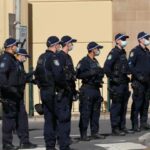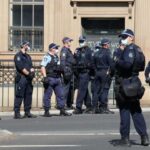The Offence of Giving False or Misleading Information to a Public Authority in NSW

Now former New South Wales police Commander Michael Rowan has been sentenced to 8 months in prison with a non-parole period of six months after pleading guilty to two counts of knowingly giving false or misleading evidence to a public authority.
The charges relate to an investigation in 2018 by the New South Wales police watchdog, the Law Enforcement Conduct Commission (LECC) into the high-ranking officer’s relationships with three female subordinates.
False evidence before the police watchdog
Under examination in the LECC, the 59-year old testified that he had lost his phone, and also downplayed his relationships with the three officers.
He gave evidence that one of the relationships was ‘fleeting’ ‘fleeting’ and that there was nothing intimate between the pair, but later admitted it was sexual and they had spent time in a hotel.
The relations occurred after senior officer had been told to have no further contact with the lower ranking officer.
Mr Rowan later denied that he changed the information to protect himself, saying he was in fact protecting the officer because she was being “targeted”.
He also said the woman would have been “subject to immediate disciplinary action and in all likelihood would have been sacked” given that the LECC was also investigating her.
Mr Rowan’s claim that he had lost his phone was also found to be untrue; the Commission finding that it was fabricated to conceal evidence of the relationships.
The LECC investigation, findings and recommendations
During its investigation, the LECC also explored the influence Mr Rowan had over another female officer, whom he considered to be a friend, and who was responsible for logging a domestic violence complaint that involved another female officer that Rowan was also “friendly” with.
The LECC ultimately found that the officer had engaged in serious misconduct when he:
- Was untruthful to the Commission while giving evidence,
- Did not declare conflicts of interest,
- Improperly influenced an officer’s recording of an event,
- Acted in a contrary way to a superior officer’s direction,
- Was inappropriately involved in the investigation of another officer, and
- Brought the state’s police force into disrepute.
The watchdog does not have power to discipline let alone bring criminal charges against police officers, so it recommended that the Office of the Director of Public Prosecutions criminally prosecute him for giving false or misleading evidence to a public authority.
The DPP acceded to that recommendation and brought the two criminal charges.
Suspension on full pay and pension retained
Mr Rowan retired on medical grounds in July 2019 after being suspended from the force on full pay in 2018. It has been reported that he continues to receive a life-long pension of about $4,800 a fortnight.
Sentencing and appeal
During the officer’s sentencing proceedings in Downing Centre Local Court, Magistrate emphasised the serious nature of the offences, saying they “strike to the heart of the justice system”.
Her Honour also stressed the “community interest in organisations like LECC being able to conduct investigations with people telling the truth” and remarked that the former officer’s conduct was especially serious given his senior position within the force.
Mr Rowan was ultimately sentenced to a full term of 8 months in prison with a minimum term of 6 months.
His defence lawyers immediately filed an appeal to the District Court of NSW against the severity of the sentence imposed, before making a successful bail application on their client’s behalf.
The former officer will therefore be at liberty until his appeal hearing in October.
The offence of giving false or misleading information
Giving false or misleading information is an offence under section 307B of the Crimes Act 1900, which carries a maximum penalty of 2 years in prison.
To establish the offence, the prosecution must prove beyond reasonable doubt that:
- You gave information to another person,
- The information was false or misleading, or omitted a matter or thing without which it was misleading,
- You knew the information was misleading, and
- The information was given to a public authority, or was given to a person exercising or performing a power, authority, duty or function under or in connection with any NSW law, or was given in compliance or purported compliance with any NSW law.
The information is only ‘misleading’ if it is false or misleading in a material particular.
The definition of ‘public authority’ is very broad, and includes:
- a government agency, administrative office or teaching service,
- a statutory body representing the Crown,
- a local government authority,
- a body required to keep certain accounts under the Public Finance and Audit Act 1983, or over which the Auditor-General has powers of audit, and
- The NSW Police Force.
You cannot be found guilty of the offence if you are able to establish, on the balance of probabilities, that the information was given to a public authority, or a person exercising a power, authority, duty or function under a NSW law, and, before you gave the information, the public authority or person described failed to take reasonable steps to inform you that giving false or misleading information was an offence.
Duress is a defence to the charge.








